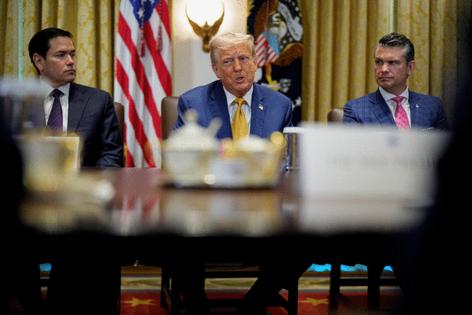Trump has just quietly pulled the plug on America’s soft-power empire
PARIS — A few years ago, at a panel in North Africa, a tone-deaf American diplomat sat before a room full of people from the global south, many from countries scarred by U.S.-led wars, and declared that he wanted to see America everywhere. Like some kind of global “McFreedom” chain, planted in every corner of the map, whose burgers don’t actually look anything like they do in the advertising.
Now, that old soft-power mindset may finally be losing its grip, if a new State Department memo is any indication. And not a moment too soon.
“While the United States will hold firm to its own democratic values and celebrate those values when other countries choose a similar path, the president made clear that the United States will pursue partnerships with countries wherever our strategic interests align,” read a memo to diplomats worldwide from Secretary of State Marco Rubio, according to Reuters.
“DO NOT use election-time messaging to advance a U.S. foreign policy goal. DO NOT use it to promote an ideology,” it added.
The message is clear: Trump wants Washington out of the global gaslighting racket. Besides, why burn billions on sneaky taxpayer-funded “civil society” operations when a free caps-locked rant will do?
The new approach doesn’t just end the lectures, but also the pretense that soft power was ever really about people’s dignity or freedom rather than about access and control.
That shift isn’t just rhetorical, with the Senate approving the president’s request to slash $8 billion in foreign aid funding, including the kind of soft-power nation-shaping activities usually carried out by the CIA-adjacent United States Agency for International Development, which Trump moved to abolish in the early days of his second term.
And what has it all actually achieved? The aim has never really been to foster the lofty values that even the West struggles to uphold, but rather to shape other societies to better serve Washington’s economic interests, no matter how wildly they diverge from local needs or realities.
Europe, the loyal sidekick, has long followed suit, with disastrous results. Democracy and human rights have served as the moral lubricant for riding shotgun on costly U.S.-led geopolitical adventures. Wars sold as humanitarianism have triggered mass displacement on European borders that have been flung open in the name of diversity. And cheap Russian energy – Europe’s economic lifeline – was sacrificed in a failed performative crusade against Russian President Vladimir Putin, with Europeans plunged into financial hardship to pay for it.
Those pointing out these glaring self-inflicted wounds have faced censorship for deviating from the accepted narrative, but now the situation has become so egregious that the truth is seeping out through the cracks like sewage in a collapsing cathedral. That reality is no longer fringe, but front page. “France’s budget bombshell is a wake-up call for Europe as it veers toward bankruptcy,” Politico headlined last week.
But while Washington is now slipping out the side door of the soft-power theater, its allies are still clinging to their scripts like aging actors in denial.
Take, for example, Britain’s latest stealthy attempt to resurrect Cold War tactics online. Just a few days ago, the investigative media outlet, Declassified UK, reported that the British government has secretly paid millions to a private marketing firm to launder its foreign-policy messaging through social media influencers. These online personalities, based in countries of strategic interest like Slovakia and the Baltics, were used to inject British talking points into local discourse, especially around election time, and audiences had no clue that they were getting MI6-crafted messaging through smiling TikTokers.
When Russia pulls this kind of thing, it’s labeled “foreign interference,” but when the West runs the same playbook, they’re mentoring independent voices, or fighting extremism or “providing a greater variety of perspectives,” or, my personal favorite, “building societal resilience to disinformation.” Because nothing says promoting intellectual rigor like flooding the internet with government-approved talking points like a busted fire hydrant.
None of this influence peddling is new. It has just been given a more modern makeover. During the Cold War, U.S. cultural diplomacy, often bankrolled by the CIA, dominated European media, arts and academia, promoting modernist art, liberal philosophy and pro-NATO narratives as the enlightened alternative to Soviet realism and Marxist critique. Dissident professors were surveilled, blacklisted or denied tenure for ideas considered too skeptical of Western military adventures.
In Western Europe, broadcast authorities were often staffed with pro-NATO gatekeepers or governed by internal policies that ensured public radio and television stayed within the safe bounds of Western orthodoxy. At the height of crises like the Korean War or the Cuban Missile Crisis, mainstream outlets defaulted to self-censorship, lest they wander too far from the “freedom vs. tyranny” script.
If Washington truly steps back from its soft-power puppetry, the world might finally be forced to negotiate on honest terms, not staged scripts. Europe, broke and bewildered, will have a choice: follow suit or fade into irrelevance and bankruptcy. For once, sovereignty has a chance of becoming more than just a buzzword.

































Comments